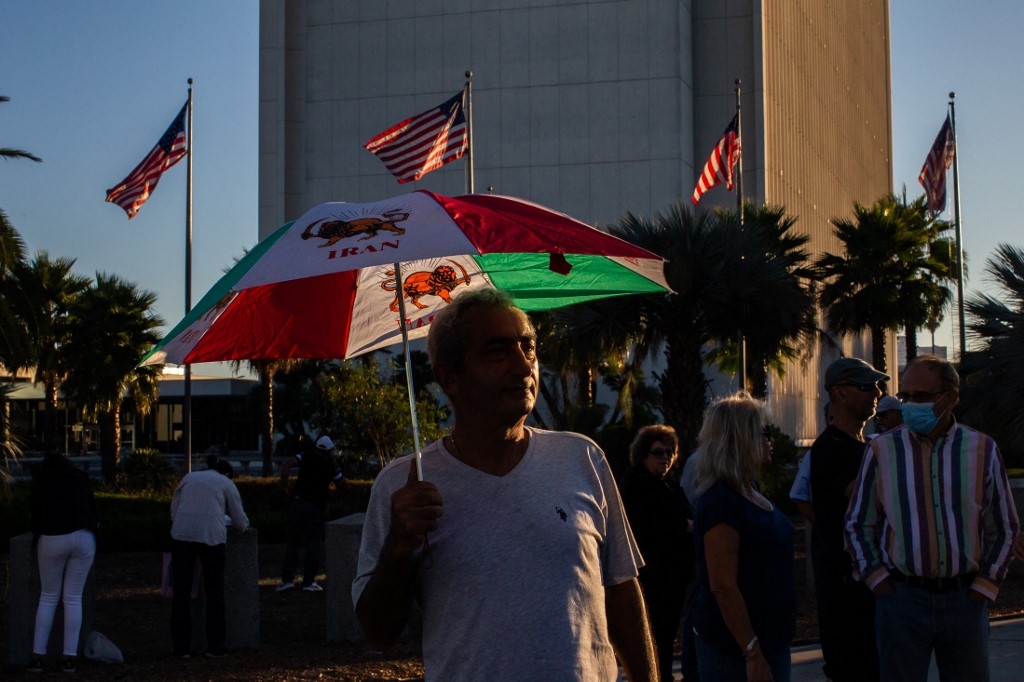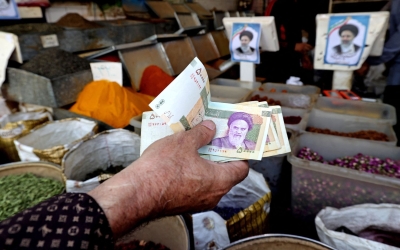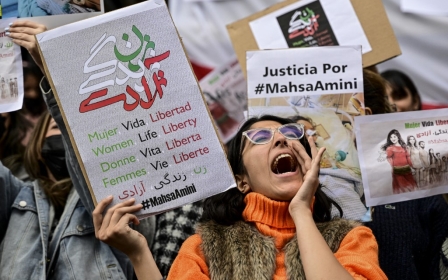How sanctions escalate anti-Iranian prejudice in the US

Earlier this year, the National Iranian American Council (NIAC), the DC-based advocacy group, published a report detailing how sanctions levied on Tehran have impinged on the lives of Iranians, including Iranian Americans, and normalised their exclusion from different realms of society as well as proliferating racially-motivated sentiments against them.
'This direct devaluation of Iranian life is now added to existing racial and religious prejudice toward Iranians in western countries'
- Pantea Javidan, research fellow
There is overwhelming evidence that even the diaspora communities that have long segregated themselves from the geography of Iran have not been unscathed by the knock-on effect of the sanctions, and find themselves discriminated against on account of their ancestral roots.
Many experts argue that the sanctions obstructing trade with Iranian entities and making it difficult to maintain legitimate trade are putting Iranians in the US on a slippery slope into perpetual exclusion.
“This direct devaluation of Iranian life is now added to existing racial and religious prejudice toward Iranians in western countries, in a societal context in which racism and xenophobia are politically mainstreamed by the far right, and the US government has become desensitised to pandemic-related morbidity and mortality in general,” Pantea Javidan, a research fellow at the Center for Human Rights and International Justice at Stanford University, told Middle East Eye.
Institutional fallout
In October of last year, Fariba Moeinpour, an Iran-born research scientist at the University of Alabama at Birmingham - who has been living in the United States since 1989 - filed a federal lawsuit against a co-worker she accused of harassing her for over nine years because of her ethnicity, and she alleged the university refused to open an investigation even when she complained.
Moeinpour alleged the ex-colleague told her repeatedly to “go back to Iran” and that “our country does not need your kind”. According to court documents, she was eventually fired after an argument with her supervisor.
There are several institutional examples of how Iranians in the US are impacted by sanctions. For instance, the popular mobile payment service Venmo has been accused of blocking transactions initiated by accounts that use terms carrying Iranian traces, including “Persian”.
Venmo has previously stated that they do not intend for their compliance to be discriminatory and that “diligence is important in ensuring that transactions do not violate the law”, in reference to Office of Foreign Assets Control sanctions.
According to a recent report by Alena Douhan, the UN special rapporteur on unilateral coercive measures, the sanctions constitute a “serious threat to human rights and dignity” of the Iranian people.
Scholarly studies show they have codified prejudicial attitudes in the daily practices of the workplace, campus and community.
And to an extent, discrimination against Iranians has a unique component.
“Iran-US hostility and sanctions dramatically influence attitudes toward Iranians that simply aren’t experienced in the same way by other Muslim-majority groups in the United States,” said Sahar Razavi, an assistant professor of political science and director of the Iranian and Middle Eastern Studies Center at California State University, Sacramento.
“That’s not to say it’s easier to be from a different country in the Mena region than Iran if you’re in the United States. Rather, the specific racism and violence toward Iranian Americans cannot be understood without acknowledgement of the influence of sanctions and US-Iran hostility,” she told Middle East Eye.
A broad pattern
Still, there are observers who maintain the vilification of Iranians and the animus they are facing is part of a broader pattern of anti-Muslim bigotry that is sweepingly on the rise in the West. They say Islamophobia has been fuelled for decades, put on steroids after the war on terror, and escalated to new heights during the tenure of Donald Trump as US president.
“The stigmatisation predates sanctions. The demonisation of the Muslim world has been taking place for centuries to justify colonialism and the subjugation of peoples by western powers, while the sanctions of today simply exist as another element in this greater saga of western dominance and aggression,” Azadeh Shahshahani, a human rights lawyer and legal and advocacy director at Project South in Atlanta, told MEE.
'The US expanded and maintained sanctions that knowingly impede the flow of essential goods'
- Assal Rad, research director
Experts say there is an interconnection between the sanctions and the denigration of Iranian people, and each of them reproduces the other.
“The fact that Iranians have been stigmatised in US political discourse, media and even popular culture has dehumanised them in such a way that a policy of broad-based sanctions, which amount to collective punishment, can be imposed with little political backlash,” said Assal Rad, the research director at the National Iranian American Council.
“Even in the case of a pandemic and international calls to ease sanctions on humanitarian grounds, the US expanded and maintained sanctions that knowingly impede the flow of essential goods,” she told MEE.
Rad said that sanctions are an integral part of US policy and they "reinforce the negative discourse" while little action is taken to amend policies that might unjustly impact the Iranian community.
Legal scholars predominantly reject the argument that sanctions can be engineered to be smart and only curtail the ability of the targeted government to achieve its objectives deemed to be malign. They say the US government’s disclaimer that Iran sanctions are not designed to punish the civilian population rings hollow.
“The sanctions primarily harm everyday Iranians, their opportunities, livelihoods, and socio-economic prospects, while there seems to be little evidence of a similar effect on the personal wealth and power of Iranian officials. This contributes greatly to stark and increasing class inequalities in Iran,” Stanford University’s Javidan said.
“The Muslim ban of the Trump administration was emblematic of Islamophobia, and though it has been rescinded, other Islamophobic laws remain, as do sanctions and the legacy of the Trump years, which have yet to be undone,” she added.
Middle East Eye propose une couverture et une analyse indépendantes et incomparables du Moyen-Orient, de l’Afrique du Nord et d’autres régions du monde. Pour en savoir plus sur la reprise de ce contenu et les frais qui s’appliquent, veuillez remplir ce formulaire [en anglais]. Pour en savoir plus sur MEE, cliquez ici [en anglais].





